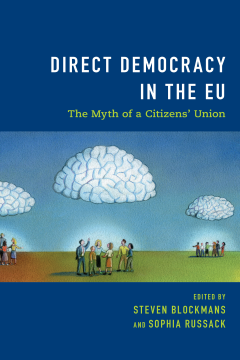
Additional Information
Book Details
Abstract
The European Union is grappling with a democracy problem. The succession of crises which have plagued the increasingly executive EU for years, has led to a rising cacophony of voices calling for fundamental change to the integration project. Yet despite the seismic shock of the Brexit referendum and the electoral upsets by nativist parties across the continent, few of the plans for EU reform include concrete proposals to reduce the age-old democratic deficit. This book is concerned with the two-pronged question of how the relationship between citizens, the state and EU institutions has changed, and how direct democratic participation can be improved in a multi-layered Union. As such, this edited volume focuses not on populism per se, nor does it deeply engage with policy and output legitimacy. Rather, the research is concerned with process and polity. Building on the notion of increasing social, economic and political interdependence across borders, this volume asks how a sense of solidarity and European identity can be rescued from the bottom up by politically empowering citizens to ‘take back control’ of their EU.
Steven Blockmans is Senior Research Fellow and the Head of the Institutions and EU Foreign Policy units at CEPS; Professor of EU External Relations Law and Governance at the University of Amsterdam.
Sophia Russack is Researcher in the Institutions unit at CEPS, PhD candidate at Maastricht University.
Table of Contents
| Section Title | Page | Action | Price |
|---|---|---|---|
| Direct Democracy In The EU | Cover | ||
| CONTENTS | vi | ||
| 1. Introduction | 1 | ||
| Part I. EU-level Mechanisms | 7 | ||
| 2. Pathways for Citizens to Engage in EU Policymaking | 9 | ||
| Part II. Transversal Aspects & Thematic Issues | 43 | ||
| 3. Europe’s Conventions Démocratiques | 45 | ||
| 4. CivTech: The Digital Revolution in Democracy and Decision-Making | 65 | ||
| 5. A New Narrative for Europe: Who will Listen? | 81 | ||
| 6. Civil Society in EU Decision-Making: A Latvian case study | 97 | ||
| Part III. Country Reports | 119 | ||
| 7. Direct Democracy in Austria: just a tool for the opposition? | 121 | ||
| 8. Direct Democracy and the Populist Zeitgeist: Bulgaria | 145 | ||
| 9. Czechia Direct Democracy: From the Shadows to the Limelight | 171 | ||
| 10. Denmark and Direct Democracy: Frontrunner and Laggard | 195 | ||
| 11. Finland: Direct Democracy and the Representational System | 215 | ||
| 12. Direct Democracy in Germany | 237 | ||
| 13. Mobilising for Democracy during Austerity in Greece | 253 | ||
| 14. Engaged but Disempowered: Italians Experience Direct Democracy | 285 | ||
| 15. The Europeanisation of Latvia’s Direct Democracy: Not There Yet | 303 | ||
| 16. Politics, Ideology and Voter Apathy: Direct Democracy in Poland | 329 | ||
| 17. The Untapped Potential of Direct Democracy in Romania | 349 | ||
| 18. Direct Democracy and the EU in Slovakia: Looking Beyond the Referendum | 373 | ||
| 19. Spain: No Country for Direct Democracy? | 389 | ||
| 20. Does Direct Democracy Work in the UK? | 411 | ||
| Part IV. Conclusions | 441 | ||
| 21. Getting Europe’s Direct Democracy Right | 443 | ||
| About the Contributors | 453 |
